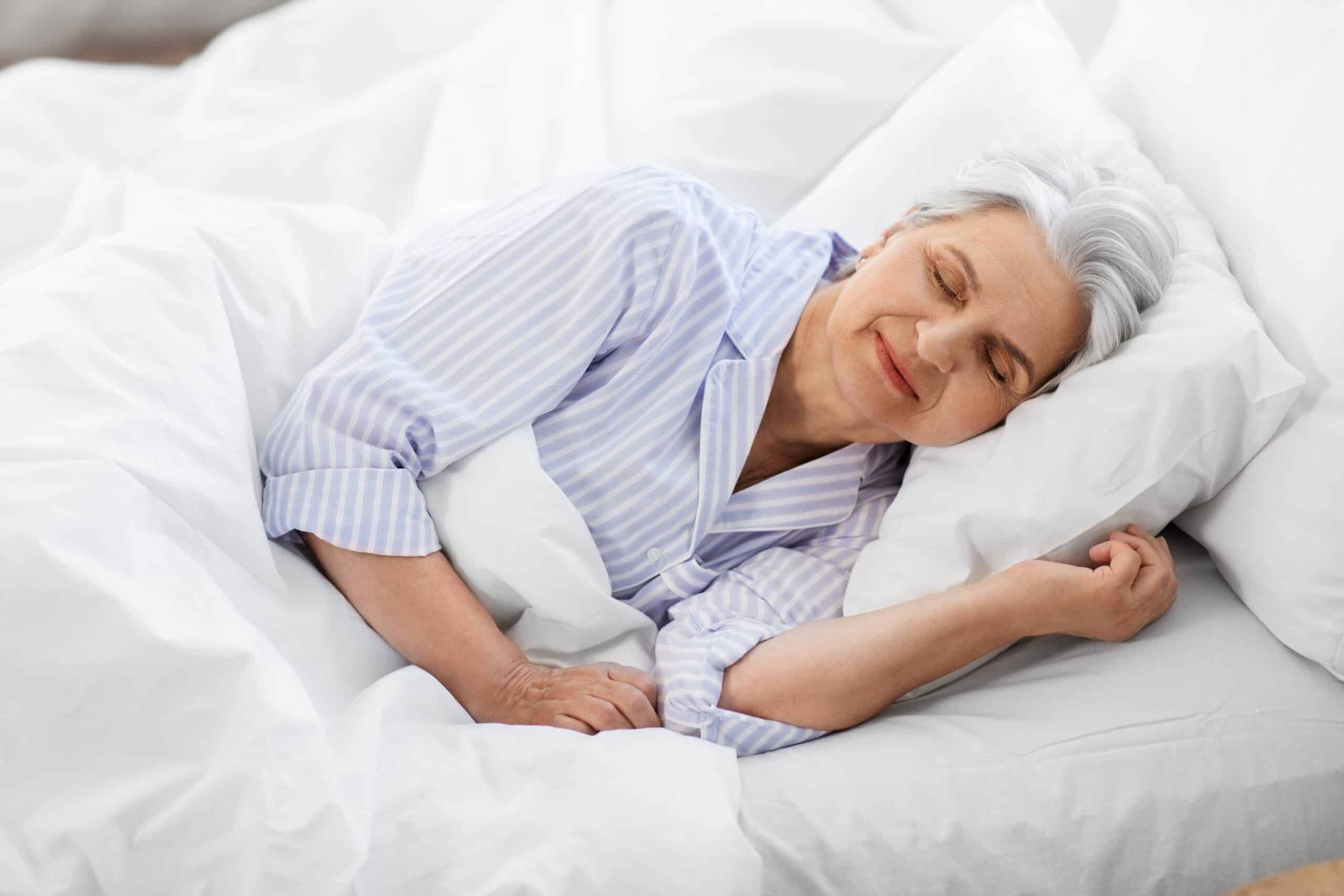Your relationship to sleep inevitably changes over time. As a kid, you may have never needed help falling asleep. As a teen, you may have yearned to sleep in every morning. As a new parent, sleep may have been impossible to come by. And how about now, in your senior years? Perhaps you find yourself struggling with insomnia. Perhaps you wake up at dawn, a true early bird. Or perhaps you find yourself tempted to nap at inopportune times. Whatever your sleep habits, you might wonder if they’re normal and healthy. So, how much sleep do seniors need?
Sleep in Your Sunset Years
Many people assume that older adults need more sleep, but is it true? According to the experts, how much sleep do seniors need to get each night?
Believe it or not, the sleep requirements for seniors are no different than those for all other adults: between seven and nine hours of sleep each night. Some people feel well rested with just seven hours of rest, while others need a full nine hours to feel their best. This varies from person to person.
Although the basic sleep requirements for optimal health remain the same throughout adulthood, many seniors notice changes in their sleeping habits as they age. The following are just a few of the differences you might detect:
- Going to Bed Early: Older people tend to go to sleep at an earlier hour than their younger counterparts. This goes hand in hand with another common change . . .
- Waking Up Early: Many seniors like to rise and shine with the early birds. Is this why they often prefer to go to bed early? Or maybe they wake up early because they’ve already gotten plenty of sleep due to their early bedtime? Who’s to say? It’s a chicken-and-egg conundrum.
- Struggling to Fall Asleep: If you often lie in bed begging the Sandman to give you a hand, you’re not alone. Many people find it tricky to fall asleep in their senior years.
- Struggling to Stay Asleep: Maybe you fall asleep okay, but you always find yourself awake in the middle of the night, tossing and turning and unable to fall back into Dreamland. This can be tremendously frustrating.
- Fighting the Temptation to Nap: Due to those last two common annoyances (struggling to fall asleep and struggling to stay asleep), you may feel sleepy during the day. Generally, experts recommend that you avoid naps as they can become a habit and interfere with your ability to get a solid night’s rest.
Why do seniors often struggle with sleep? Although sometimes there’s no clear cause, other times, it’s due to a health condition or medication. Whatever the cause, it’s important to seek help if you often struggle to sleep well. A lack of sleep can cause many negative side effects, including irritability, memory problems, depression, and an increased risk of falling. Talk to your doctor for help improving your sleep schedule. You can also try the following ideas:
- Be consistent with your sleep schedule. The body craves routine. Try to stick to your schedule even on weekends, holidays, and travel days.
- Avoid napping. Although they may feel good in the moment, naps may keep you up at night, especially if you nap in the late afternoon or evening.
- Create a bedtime routine. Our bodies struggle to go from activity to sleep at the drop of a hat. To prepare your body for bed and increase the likelihood of falling asleep without any fuss, create a routine and follow it. For example, an hour before you hope to fall asleep, you might dim the lights, take a warm bath, put on your pajamas, and read a book.
- Avoid electronics before bed. Avoid watching TV or using a cell phone, tablet, or computer just before bedtime. The light and stimulation may affect your ability to fall asleep.
- Keep your bedroom cool. Most doctors recommend that you keep your thermostat between 60 and 68 degrees Fahrenheit at night for optimal sleep.
- Avoid caffeine later in the day. Caffeine, which is found in coffee, tea, soda, and even chocolate, may keep you buzzing past your bedtime if you consume it past 2 or 3 PM.
_____
How much sleep do seniors need? Approximately seven to nine hours — the same as all adults! If you’re having trouble meeting that number, make an appointment with your doctor.
Are you looking for a community that provides a positive, healthy atmosphere where your loved ones can enjoy their golden years? The Shores of Lake Phalen may be just the place. It’s an assisted living and memory care community in a quiet, peaceful environment in Maplewood, Minnesota. Surrounded by a gorgeous wooded setting between two lakes, our residence offers the accessibility of apartment-style housing with the atmosphere and elegance of a resort. We offer numerous health and safety amenities, fun events and activities, a friendly and accommodating staff, and much more. Schedule a tour of the community to explore our spacious apartments and more. We look forward to hearing from you!

